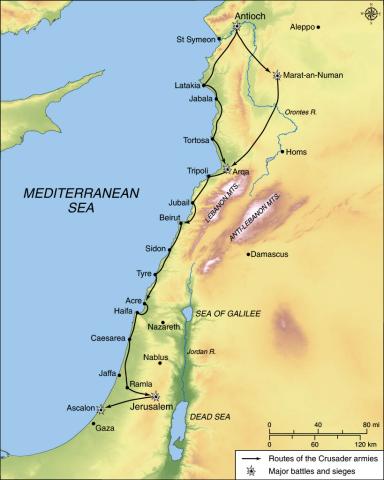The March to Jerusalem
[10.35.3] Aliā vērō diē equitāvērunt nostrī ultrā dē Sem, et invēnērunt bovēs et ovēs et asinōs, multaque animālia; camēlōs quoque dēpraedātī sunt ferē tria mīlia. Obsēdimus vērō castrum suprā dictum per trēs mēnsēs, minus ūnā diē; ibique pascha Dominī celebrāvimus IIII Īdūs Aprilis. Nāvēs quippe nostrae vēnērunt prope nōs in quendam portum, quamdiū fuimus in illā obsidiōne, dēferentēs maximum mercātum, scīlicet frūmentum, vīnum et carnem et cāseum, et hordeum, et oleum, unde maxima ūbertās fuit in tōtā expedītiōne. In illā dēnique obsidiōne fēlīciter accēpērunt martyrium plūrēs ex nostrīs, vidēlicet Anselmus dē Riboatmont, Willēmus Picardus, et aliī plūrēs quōs ignōrō. Rēx quoque Tripolis saepe nūntiōs mittēbat seniōribus ut dīmitterent castrum et cum eō concordārentur. Audientēs itaque nostrī hoc, scīlicet dux Godefridus, et Raimundus comes Sānctī Egidīī, ac Rotbertus Nortmannus, Flandrēnsisque comes, videntēsque novōs frūctūs properāsse, quia in mediō Mārtiō comedēbāmus novellās fabās, mediō quoque Aprīlī frūmentum, cōnsiliātī sunt nostrī, dīcentēs bonum valdē esse Hierosolimītānum iter explēre cum novīs frūctibus.
notes
(February–May 1099) The siege of Archae has continued for three months, with provisions arriving by ship. There were crusader deaths. The governor of Tripoli asks them to abandon the siege and make a treaty with him. The leaders decide, since the spring was bringing harvests, that they should keep moving towards Jerusalem.
ultrā dē Sem: “beyond (the valley of) the Sem." Probably the Bukaya/Bouquaia Plain, near Homs, Syria (see 10.34.4).
castrum suprā dictum: Archae, modern Arqa (see 10.35.1).
per trēs mēnsēs, minus ūnā diē: from February 14 to May 13, 1099.
IIII Īdūs Aprilis: April 10, 1099.
Nāvēs quippe nostrae: these ships were English and Genoese.
in quendam portum: probably what is now Tartus.
Anselmus dē Riboatmont: Anselm of Ribemont, also called Anselm of Ostrevent, “the Bearded.”
Willēmus Picardus: William the Picard; not otherwise known.
Rēx quoque Tripolis: the quazi of Tripoli.
Flandrēnsisque comes: Robert of Flanders.
ut dīmitterent castrum: i.e., that they abandon the siege of Archa
quia in mediō Mārtiō comedēbāmus novellās fabās: apparently the bean harvest ripened in the middle of March.
mediō quoque Aprīlī frūmentum: the grain was ripe by the middle of April.
vocabulary
frūmentum –ī, n.: grain
cāseus –ī, m.: cheese
hordeum –ī, n.: barley
ūbertās –tātis, f.: richness, fullness
properō (1): to make haste, to hasten, be quick
faba –ae, f.: bean

